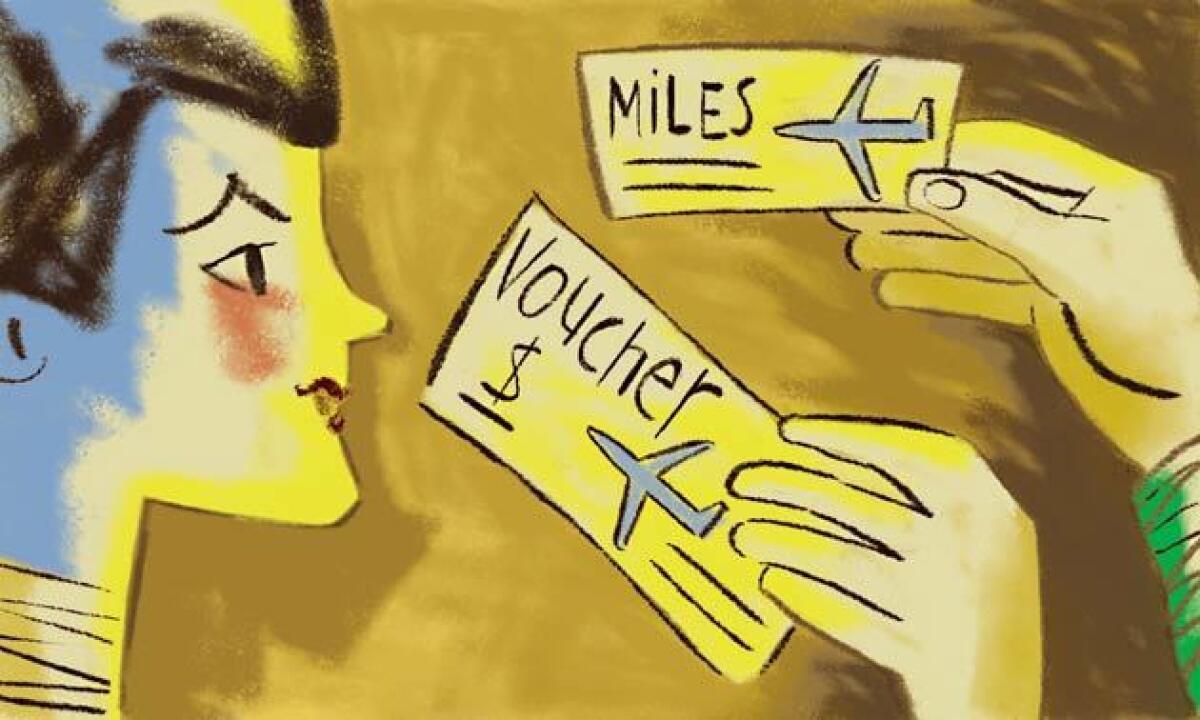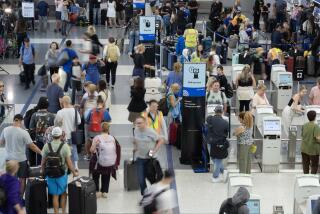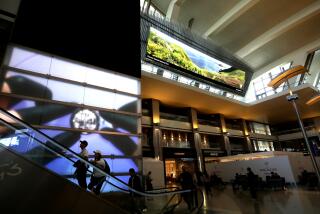On the Spot: What airlines owe customers for long tarmac waits

- Share via
Question: I was on a flight with Delta that was delayed one hour because of mechanical problems. That was followed by three hours of waiting on the tarmac. Delta sent me 1,000 miles as a courtesy. When I complained, the airline also sent me a $125 travel voucher. Is what they are doing correct, or am I supposed to get something more? Are there federal rules and regulations for this kind of situation?
Barbara Fallick, Santa Monica
Answer: The rules on what airlines are required to do changed this year, under the Department of Transportation’s Enhancing Airline Passenger Protections statute. Alas for the traveler, those rules are designed to impose “fines on airlines that are found to be in violation of the tarmac rule, not for passenger compensation,” said Bill Adams, a DOT spokesman.
Under these rules, a tarmac delay of two hours requires the airline to provide food, water and working lavatories; at three or more hours, passengers must be given the opportunity to deplane. In other words, the only thing you’re entitled to is to be treated like a human being, which is an improvement over the horror stories about multi-hour waits without any of the above, including the human being part.
The rules appear to be helping, so far. From May to August 2009, there were 529 tarmac delays of three hours or more. In the same period in 2010, there were eight, Adams said.
Kate Hanni, whose own tarmac horror story (nine hours in Austin, Texas) led her to found FlyersRights.org, called the new regulations “a spectacular success.”
“The lack of phone calls to our hotline about these ‘stranding’ events is evidence that we were right on the money about this issue,” said Hanni, who has advocated legislation (“We will be fighting tooth and nail to get a permanent law through Congress regardless of the makeup of the House and Senate. But it may be an uphill battle”) and procedural changes. “The airlines are indeed becoming more efficient as a result of this forced rule.”
The compensation Fallick was offered, Hanni said, is a result of airlines becoming more responsive to customers. “Specific compensation is not required for those delays, so this gal was fortunate that the airline was willing to offer her something,” Hanni said.
What the airline will do is covered under its contract of carriage. (You can find Delta’s at https://www.delta.com/legal/contract_of_carriage/index.jsp.) Delta did not respond to our request for comment, but we can say that its contract, as stated on that website, does not mention financial compensation. Instead, it focuses on getting you to your destination, making meals available and/or hotels and partial refunds for unused parts of tickets.
The DOT maintains the Aviation Consumer Protection Division; you can find its complaint form at airconsumer.ost.dot.gov/escomplaint/es.cfm or by calling (202) 366-2220. (Note that the recording says, “If you have an airline service issue, we recommend you first contact the airline in an attempt to get it resolved. Most service issues experienced by air travelers do not violate any federal rules but instead concern individual airlines’ policies or procedures. The airline is in the best position to address and resolve this concern.”)
The big question is whether airlines will. The protections statute may be a battle victory, but passengers have not won the war.
Have a travel dilemma? Write to [email protected]. We regret we cannot answer every query.
More to Read
Sign up for The Wild
We’ll help you find the best places to hike, bike and run, as well as the perfect silent spots for meditation and yoga.
You may occasionally receive promotional content from the Los Angeles Times.







